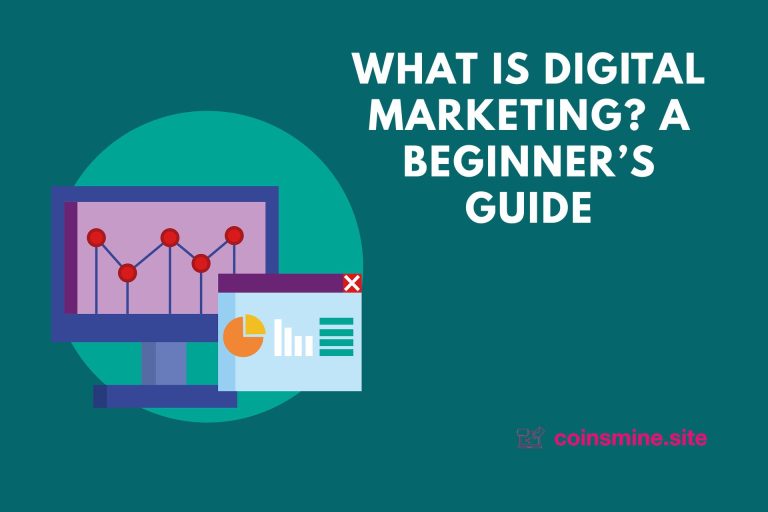What Is Digital Marketing? A Beginner’s Guide: Having an online presence is now necessary in the current digital era, and whether you are an entrepreneur, marketer, or small business owner, knowing what digital marketing is can help you reach and interact with your target audience.
Simply put, it’s the use of online platforms and tools—like social media, websites, search engines, and email—to promote products, services, or brands. This guide will walk you through the basics of digital marketing, its main components, and why it’s a powerful tool for growing your business in an increasingly connected world.
What Is Digital Marketing? A Beginner’s Guide
In today’s technology-driven world, businesses need to meet customers where they spend most of their time—online. Whether you’re scrolling through Instagram, searching for a new product on Google, or reading a blog, you’re constantly exposed to digital marketing.
Let’s break it down in this beginner-friendly guide.
What Is Digital Marketing?
Digital marketing refers to all marketing initiatives that employ the internet or an electronic device. Businesses employ digital platforms such as search engines, social media, email, and websites to engage with present and prospective customers.
Digital marketing is interactive, quantifiable, and frequently less expensive than traditional marketing (TV, radio, print ads). Businesses can use it to target messages to particular demographics, reach a global audience, and monitor real-time outcomes.
Why Is Digital Marketing Important?
Here are a few key reasons why digital marketing has become essential:
-
Wider Reach: People around the world are online. Even a tiny business may reach a global audience with digital marketing.
-
Targeted Audience: By using factors like age, geography, hobbies, and online activity, you may direct your advertisements and content to a certain group of people.
-
Cost-Effective: Compared to traditional methods, digital marketing can offer better results at a lower cost, especially for small businesses.
-
Measurable Results: Tools like Google Analytics allow you to see how your campaigns are performing in real time and make quick adjustments.
-
Better Engagement: Digital platforms allow two-way communication. Customers can comment, share, and interact directly with brands.
Core Components of Digital Marketing.
Digital marketing is a broad field. Here are the most important components you should know:
(1) Search Engine Optimization (SEO).
Optimizing your website to rank higher in search engine results (such as Google) is known as SEO. A well-optimized website receives more organic (free) traffic.
Example: If you run a bakery and someone searches “best chocolate cake near me,” SEO helps your site appear in those results.
(2) Content Marketing.
This involves creating valuable content to attract and retain an audience. Content can include blog posts, videos, infographics, eBooks, and more.
Example: A fitness brand might publish a blog about “10 Tips for Home Workouts” to engage users and promote their products.
(3) Social Media Marketing.
Social media platforms like Facebook, Instagram, LinkedIn, and TikTok are powerful tools for connecting with your audience, building brand awareness, and driving traffic.
Example: A fashion brand might showcase new arrivals through Instagram Reels and partner with influencers for promotion.
(4) Pay-Per-Click Advertising (PPC).
Google Ads and Facebook Ads are typical PPC platforms.
Example: Running a Google Ad for “Affordable Wedding Photographer” that appears when someone searches for it.
(5) Email Marketing.
One of the best digital marketing platforms is still email. It is employed to cultivate leads, advertise goods, and foster client loyalty.
Example: A restaurant might send out a weekly newsletter with exclusive discounts and new menu updates.
(6) Affiliate Marketing.
In affiliate marketing, a company pays people or websites (affiliates) a commission in exchange for generating traffic or sales via their referral links.
Example: A tech blog reviews a gadget and includes an affiliate link to buy it on Amazon. If someone makes a purchase, the blog earns a commission.
Tools and Platforms in Digital Marketing.
Here are some popular tools that help manage and optimize digital marketing campaigns:
-
SEMrush / Ahrefs – for SEO research and competitor analysis.
-
Mailchimp – for managing email marketing campaigns.
-
Canva – for designing graphics and social media posts.
Getting Started With Digital Marketing.
If you’re new to digital marketing, here are some steps to help you begin:
-
Set Clear Goals: What do you want to achieve—more website traffic, leads, sales, or brand awareness?
-
Know Your Audience: Understand their needs, preferences, and where they spend time online.
-
Build a Website: Your website is your digital storefront. Make sure it’s mobile-friendly and easy to navigate.
-
Create Quality Content: Focus on providing value to your audience, not just selling.
-
Experiment and Analyze: . Try out various tactics, track outcomes, and keep becoming better.
Final Thoughts.
Knowing the fundamentals of digital marketing gives you a competitive edge, whether you are an entrepreneur, small business owner, or aspiring marketer. As the online world expands, so do the opportunities to connect, engage, and succeed. Digital marketing is no longer optional—it is imperative.
By starting small, focusing on your audience, and learning continuously, you can master the digital landscape and turn online attention into real-world results.



